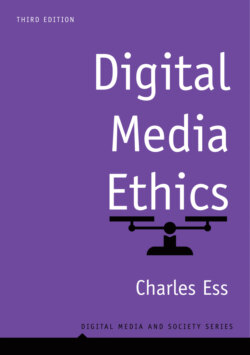Digital Media Ethics

Реклама. ООО «ЛитРес», ИНН: 7719571260.
Оглавление
Charles Ess. Digital Media Ethics
Contents
Guide
Pages
Series title. Digital Media and Society Series
Digital Media Ethics
Copyright page
In memoriam
Foreword Luciano Floridi
Preface to the Third Edition
Notes
Acknowledgments
chapter one Central Issues in the Ethics of Digital Media
Chapter overview
Case-study: Amanda Todd and Anonymous
Introduction
(Ethical) life in the (post-)digital age?
1. Digital media, analogue media: convergence and ubiquity
2. Digital media and “greased information”
3. Digital media as communication media: fluidity, ubiquity, global scope, and selfhood/identity
Digital media ethics: How to proceed?
Is digital media ethics possible? Grounds for hope
How to do ethics in the new mediascape: Dialogical approaches, difference, and pluralism
Further considerations: Ethical judgments
Overview of the book, suggestions for use
Chapter arrangement, reading suggestions
Case-studies; discussion/reflection/writing/research questions
Notes
chapter two Privacy in the (Post-)Digital Era?
Chapter overview
Information and privacy in the global digital age “Privacy” and anonymity online – is there any?
Interlude: Can we meaningfully talk about “culture?”
“Privacy” in the global metropolis: Initial considerations
You don’t have to be paranoid – but it helps ..
If you’re not paranoid yet ... terrorism and state surveillance
“Privacy” and private life: Changing attitudes in the age of social media and mobile devices
“Privacy” and private life: Cultural and philosophical considerations
“Privacy” and private life: First justifications, more cultural differences – transformations and (over-?)convergence
“Privacy” and private life: Cultural differences and ethical pluralism
Philosophical and sociological considerations: New selves, new “privacies?”
1. Culture?
2. The privacy paradox
Notes
chapter three Copying and Distributing via Digital Media: Copyright, Copyleft, Global Perspectives
Chapter overview
The ethics of copying: Is it theft, Open Source, or Confucian homage to the master? Intellectual property: Three (Western) approaches
(a)Copyright in the United States and Europe
(b)Copyleft/FLOSS
FLOSS in practice: the Linux operating system
FLOSS in practice
2. Intellectual property and culture: Confucian ethics and African thought
Notes
chapter four Friendship, Death Online, Slow/Fair Technology, and Democracy
Chapter overview
Friendship online? Initial considerations
Friendship online: Additional considerations
Friendship – and death – online
Slow technology and the Fairphone
Case-study: Are you ethically obliged to purchase a Fairphone?
Digital media and democratization: First considerations
Democracy, technology, cultures
Notes
chapter five Still More Ethical Issues: Digital Sex, Sexbots, and Games
Chapter overview
Introduction: Is pornography* an ethical problem – and, if so, what kind(s)?
Pornography*: More ethical debates and analyses
Pornography* online: A utilitarian analysis
“Complete sex” – a feminist/phenomenological perspective
Sex with robots, anyone?
Now: What about games?
Sex and violence in games
Notes
chapter six Digital Media Ethics: Overview, Frameworks, Resources
Chapter overview
A synopsis of digital media ethics
Basic ethical frameworks
1. Utilitarianism
Strengths and limits
(a)How do we numerically evaluate the possible consequences of our acts?
(b)How far into the future must we consider?
(c)For whom are the consequences that we must consider?
2. Deontology
Difficulties ..
3. Meta-ethical frameworks: Relativism, absolutism (monism), pluralism. Ethical relativism
Ethical absolutism (monism)
Beyond relativism and absolutism: Ethical pluralism
Strengths and limits of ethical pluralism
4. Feminist ethics
Applications to digital media ethics
5. Virtue ethics
Virtue ethics: sample applications to digital media
6. Confucian ethics
Confucian ethics and digital media: sample applications
7. African perspectives
Applications
Notes
References
Index
POLITY END USER LICENSE AGREEMENT
Отрывок из книги
Third Edition
charles ess
.....
Moreover, our personal data are being collected in ever increasing amounts through the emerging “Internet of Things” (IoT) – e.g., in the name of so-called Smart Cities which promise greater energy efficiencies, better traffic flow, etc., through constant monitoring of individuals and our devices (including, for example, our cars, our electric meters, our smart assistants, and so on), coupled with a growing web of cameras and sensors embedded in the environment around us. It is not difficult to see that the IoT thereby presents still more threats to individual and group privacy (e.g., Rouvroy 2008; Bunz and Meikle 2018, 123–5) – especially as the IoT threatens to easily morph into a total surveillance system, as exemplified in the Chinese SCS.
Thirdly, fluid and interactive digital media enjoy a global scope, which leads to still more urgent ethical issues. Our communications can quickly and easily reach very large numbers of people around the globe: like it or not, our use of digital technologies thus makes us cosmopolitans (citizens of the world) in striking new ways. We are forced to take into account the various and often very diverse cultural perspectives on the ethical issues that emerge in our use of digital media. So I will stress throughout this book how the assumptions and ethical norms of different cultures shape specific ways of reflecting on such matters as privacy (chapter 2), copyright (chapter 3), pornography, sexbots, and violence (chapter 5).
.....